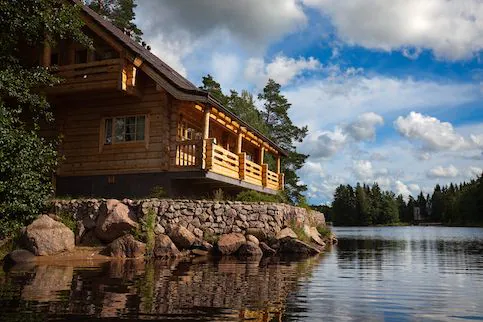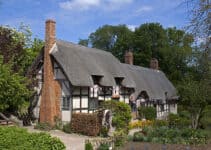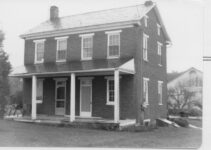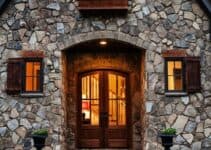In British property terms, a cottage has one of the widest-ranging definitions. As such, it’s often used interchangeably with other terms like lake house, bungalow, and so on. But when it comes to cottage vs lake house, what’s the difference?
The difference between a cottage vs lake house is that a cottage is a small residential property located anywhere in the country. A lake house, on the other hand, is a residential property that borders a lake in some way.
It’s worth understanding the difference between all these terms so you can know when it’s actually appropriate to use them interchangeably. This is exactly what we’ll look at in this article: the difference between a lake house and a cottage.

Definitions of Cottage and Lake House
Before we start looking at the differences, it’s helpful to define each type of property. Understanding the basic definitions should highlight the main differences because they’re fairly clear-cut.
Cottage Definition
A cottage, generally speaking, is a small residential property comprising of 2 or more floors. There’s no set amount of bedrooms for a cottage, but the standard is 2-3. In archaic property terms, a cottage doesn’t have surrounding land, although this isn’t something we really stick to anymore.
Lake House Definition
A lake house, unsurprisingly, is a residential property that borders a lake. The house itself doesn’t have to be on the bank of a lake, as long as its land boundaries end there.
In the UK, lake houses aren’t massively common. You’re far more likely to find a house bordering a canal or river than a lake!

What is the Difference Between a Lake House and a Cottage?
The main difference between a lake house and a cottage is that a cottage can be built near a lake but not all lake houses are cottages. If that sounds confusing, here’s a deeper explanation of the difference.
1. Location
This is the biggest difference between a lake house and a cottage. As the name suggests, a lake house can only exist bordering a lake in some regard. A cottage, however, can be built anywhere.
You can find cottages in cities or suburban areas, or standing alone in the middle of the countryside. This is why lake houses can be cottages, but not all cottages are lake houses.
By extension, a lake house could be a cabin, a static caravan, a full house, or just about any other residential property. It’s not a particularly strict definition because it primarily depends on location.
2. Land
A cottage will typically have a small garden and maybe a bit more land depending on where it’s built. By definition, a cottage can’t have “land”, but the legal understanding of this is more than 4 acres.
Of course, not many of us would consider a cottage with less than 4 acres to be lacking space.
A lake house, on the other hand, could have loads of land depending on when it was built and the surrounding area. The British Land Registry states that, if a lake is privately owned, it belongs to the property that owns the land enclosing the body of water.
3. Amenities
Cottages may have garages, outbuildings, and standard modern amenities. Much of this depends on when they were renovated and where they were built. After all, it’s not common to find an urban cottage that has an attached garage.
Lake houses can have a jetty for access to the lake, which might also include a boathouse. Also, if they’re in particularly rural locations, it’s not uncommon for a lake house to not have mains electricity, water, and sewage systems. Again, much of this can depend on when they were built and the age of any renovations.
4. Variations
Despite having a wide-ranging definition, there aren’t many variations on the idea of a cottage in the UK. You get terms such as “fisherman’s cottage” and “holiday cottage”, but these typically define the size of the building and how often it’s used.
A lake house, however, can be seen as having even fewer variations because it’s simply a house built near a lake. As mentioned, this could mean it’s anything from a small wooden cabin to a massive mansion. Provided it’s built near a lake, we can call it a lake house.
Final Thoughts
Hopefully, this article has clarified the difference between a cottage and lake house. It’s not a difficult one to understand, but at least now you’ll be able to explicitly define the 2 types of property!




